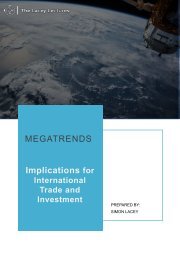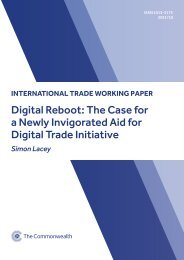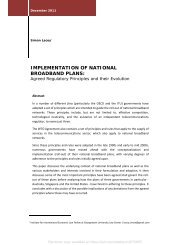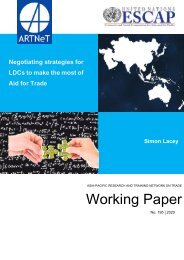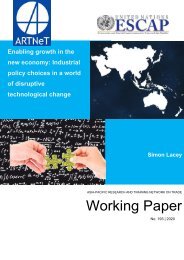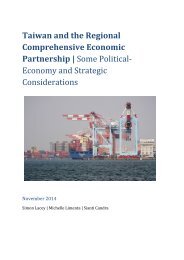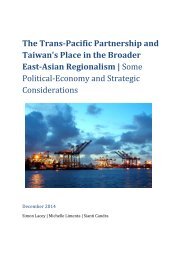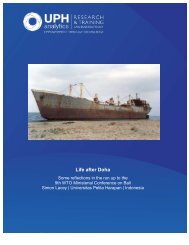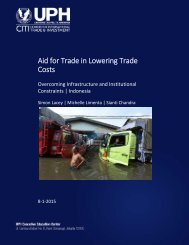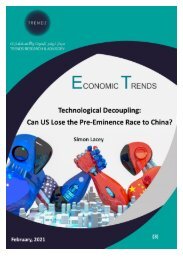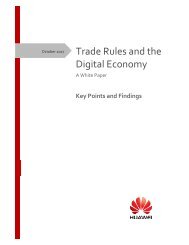Cross Border Data Flows: The impact of data localisation on IoT
This industry report seeks to shed new light on the costs of imposing data localization requirements or other restrictions on cross-border data flows with respect to the important economic growth likely to result from the uptake and adoption of IoT in manufacturing, agriculture and other important sectors of the economy. It chooses 3 large emerging markets in order to showcase its model, namely Brazil, Indonesia and South Africa.
This industry report seeks to shed new light on the costs of imposing data localization requirements or other restrictions on cross-border data flows with respect to the important economic growth likely to result from the uptake and adoption of IoT in manufacturing, agriculture and other important sectors of the economy. It chooses 3 large emerging markets in order to showcase its model, namely Brazil, Indonesia and South Africa.
Create successful ePaper yourself
Turn your PDF publications into a flip-book with our unique Google optimized e-Paper software.
CROSS-BORDER DATA FLOWS: THE IMPACT OF DATA LOCALISATION ON IOT<br />
<str<strong>on</strong>g>The</str<strong>on</strong>g> <str<strong>on</strong>g>impact</str<strong>on</strong>g> <str<strong>on</strong>g>of</str<strong>on</strong>g> <strong>IoT</strong> <strong>on</strong> emerging ec<strong>on</strong>omies is undervalued.<br />
Previous studies have tried to quantify the <str<strong>on</strong>g>impact</str<strong>on</strong>g><br />
<str<strong>on</strong>g>of</str<strong>on</strong>g> <strong>IoT</strong> <strong>on</strong> ec<strong>on</strong>omic growth, <str<strong>on</strong>g>of</str<strong>on</strong>g>ten assuming that<br />
advanced, digitised and capital-rich countries al<strong>on</strong>e will<br />
reap the majority <str<strong>on</strong>g>of</str<strong>on</strong>g> any gains. Further, previous studies<br />
have <str<strong>on</strong>g>of</str<strong>on</strong>g>ten <str<strong>on</strong>g>of</str<strong>on</strong>g>fered a static perspective by excluding<br />
the dynamic effects <str<strong>on</strong>g>of</str<strong>on</strong>g> technological change. Although<br />
historical precedence shows how mobile c<strong>on</strong>nectivity<br />
has allowed emerging ec<strong>on</strong>omies to leapfrog several<br />
steps in their ec<strong>on</strong>omic growth, the <str<strong>on</strong>g>impact</str<strong>on</strong>g> <str<strong>on</strong>g>of</str<strong>on</strong>g> <strong>IoT</strong> and<br />
5G <strong>on</strong> emerging ec<strong>on</strong>omies is less well known.<br />
This report aims to fill the gaps in the existing literature<br />
by looking at Brazil, Ind<strong>on</strong>esia and South Africa. <str<strong>on</strong>g>The</str<strong>on</strong>g>se<br />
countries are not just representatives <str<strong>on</strong>g>of</str<strong>on</strong>g> South & Latin<br />
America, South-East Asia and Africa – but in each <str<strong>on</strong>g>of</str<strong>on</strong>g><br />
these countries, there has been a public debate <strong>on</strong><br />
the negative <str<strong>on</strong>g>impact</str<strong>on</strong>g> <str<strong>on</strong>g>of</str<strong>on</strong>g> restrictive measures <strong>on</strong> crossborder<br />
<str<strong>on</strong>g>data</str<strong>on</strong>g> flows. Brazil proposed (and fundamentally<br />
recast) Marco Civil da Internet until 2014, removing<br />
<str<strong>on</strong>g>data</str<strong>on</strong>g> <str<strong>on</strong>g>localisati<strong>on</strong></str<strong>on</strong>g> elements; 6 Ind<strong>on</strong>esia had its Electr<strong>on</strong>ic<br />
Informati<strong>on</strong> and Transacti<strong>on</strong>s Law (EIT) amended in<br />
2018; 7 and in South Africa, the c<strong>on</strong>diti<strong>on</strong>s subject to<br />
which pers<strong>on</strong>al informati<strong>on</strong> could be transferred abroad<br />
were debated at length in the c<strong>on</strong>text <str<strong>on</strong>g>of</str<strong>on</strong>g> enacting the<br />
Protecti<strong>on</strong> <str<strong>on</strong>g>of</str<strong>on</strong>g> Pers<strong>on</strong>al Informati<strong>on</strong> (POPI) Act in 2013<br />
and subsequent implementing acts. 8<br />
<str<strong>on</strong>g>The</str<strong>on</strong>g> potential gains for developing countries,<br />
meanwhile, are estimated to be far-reaching.<br />
C<strong>on</strong>nectivity has proven to have major trade facilitating<br />
effects. <str<strong>on</strong>g>The</str<strong>on</strong>g> improvements that <strong>IoT</strong> technologies have<br />
brought to logistics and digital customs soluti<strong>on</strong>s, or<br />
cost-reducti<strong>on</strong>s to multinati<strong>on</strong>al enterprises, allow for<br />
faster and more seamless business processes, shorter<br />
product-development cycles and enhanced business<br />
intelligence. All <str<strong>on</strong>g>of</str<strong>on</strong>g> these benefits facilitate a more<br />
efficient exchange <str<strong>on</strong>g>of</str<strong>on</strong>g> goods, services and investments<br />
across borders, saving billi<strong>on</strong>s in transacti<strong>on</strong> costs and<br />
allowing for more emerging ec<strong>on</strong>omies to participate<br />
in, and reap the benefits <str<strong>on</strong>g>of</str<strong>on</strong>g>, world trade and global<br />
supply chains.<br />
Sectors heavily <str<strong>on</strong>g>impact</str<strong>on</strong>g>ed by <strong>IoT</strong> — in the light<br />
manufacturing (e.g. textiles, chemicals and household<br />
goods) or agri-food sectors, for example — also play<br />
a crucial role in emerging ec<strong>on</strong>omies where the valuechains<br />
are increasingly interlinked and becoming<br />
‘smarter’. 9 <strong>IoT</strong> and related technologies will have an<br />
inordinately large <str<strong>on</strong>g>impact</str<strong>on</strong>g> <strong>on</strong> emerging ec<strong>on</strong>omies<br />
because they will address supply-side c<strong>on</strong>straints<br />
in sectors such as educati<strong>on</strong> or healthcare. Public<br />
transport is critical for c<strong>on</strong>necting producers to<br />
markets, transporting workers to factories, and labour<br />
to places where it can be more productive (i.e. from<br />
rural areas to cities), and public transport networks are<br />
ripe for reaping the many benefits provided by <strong>IoT</strong> and<br />
related technologies.<br />
6. See Cecile Zwiebach, Brazil’s Internet Governance and <str<strong>on</strong>g>Data</str<strong>on</strong>g> Protecti<strong>on</strong> Legislati<strong>on</strong>: A New Legal Framework Aimed at Providing Guidelines for a Rapidly Evolving Envir<strong>on</strong>ment,<br />
published in: “Ethisphere Magazine”, 2015.<br />
7. See Kristo Molina, Ind<strong>on</strong>esian Electr<strong>on</strong>ic Informati<strong>on</strong> and Transacti<strong>on</strong>s Law Amended, published <strong>on</strong> “White and Case / Our Thinking / Case Publicati<strong>on</strong>s and Events”, 2016.<br />
8. See Michelle De Bruyn, <str<strong>on</strong>g>The</str<strong>on</strong>g> Protecti<strong>on</strong> <str<strong>on</strong>g>of</str<strong>on</strong>g> Pers<strong>on</strong>al Informati<strong>on</strong> (POPI) Act - Impact On South Africa, published in: “Internati<strong>on</strong>al Business & Ec<strong>on</strong>omics Research Journal (IBER)”<br />
1315 – 1339, 2014.<br />
9. See for example Gwen Robins<strong>on</strong>, Marrian Zhou and Erwida Maulia How the death <str<strong>on</strong>g>of</str<strong>on</strong>g> fast fashi<strong>on</strong> is transforming Asia's garment industry: New technology and demanding c<strong>on</strong>sumers<br />
unravel a decades-l<strong>on</strong>g race to the bottom published in: Nikkei Asian Review, 2019.<br />
9




